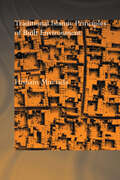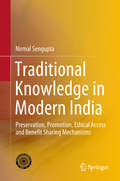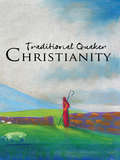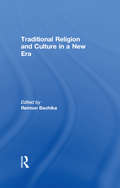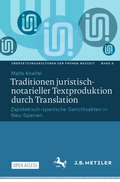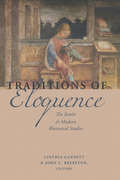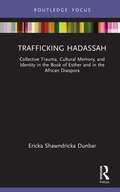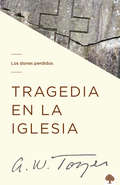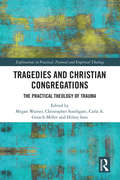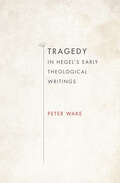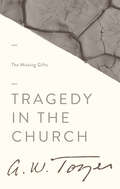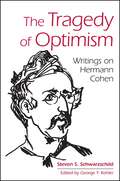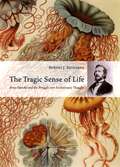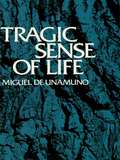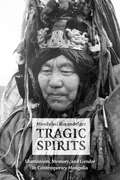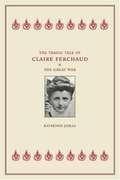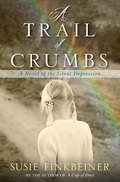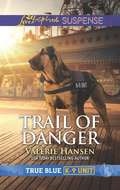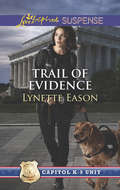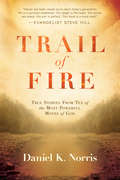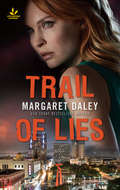- Table View
- List View
Traditional Islamic Principles of Built Environment
by Hisham MortadaWritten with the non-Muslim reader in mind, this book analyses the principles and values established by Islamic tradition to govern the social and physical environments of Muslims.The picture of Islam that emerges from this work is of a way of life with social ideals. Relying on the Qur'an and Sunna, the basic sources of Islamic law, and using examples of the built environment of early Muslims in North Africa, the Middle East, Europe and Central Asia, the author explains how following these ideals can create an urban environment that responds to social and environmental variables.Islamic views on the controversial issue of modernisation are also examined.This book will be of interest to people in the fields of urban planning, architecture, sociology, anthropology, housing and built environment, as well as Islamic studies.
Traditional Knowledge in Modern India: Preservation, Promotion, Ethical Access and Benefit Sharing Mechanisms
by Nirmal SenguptaThis book demonstrates how traditional knowledge can be connected to the modern world. Human knowledge of housing, health and agriculture dates back thousands of years, with old wisdom developing and becoming modern. But in the past few decades, global communities have increasingly become aware that some of this valuable knowledge has fallen by the wayside. This has sparked systematic efforts at the local, national and global levels to connect this neglected knowledge to the modern world.It discusses the origin of the topic, its importance, recent developments in India and abroad, and what is being done and still needs to be done in order to preserve India’s traditional knowledge. The discussions address a broad range of fields and organizations: from Basmati rice to Ayurvedic cosmetics; from traditional irrigation and folk music to modern drug discovery and climate change adaptation; and from the Biodiversity Convention to the WHO, WTO and WIPO.
Traditional Logic Book I: Introduction To Formal Logic
by Martin CothranThis book discusses traditional logic rather than modern logic. Traditional logic is the study of the classical syllogism; modern logic is the study, primarily, of the calculus of propositions.
Traditional Quaker Christianity
by Susan Smith Terry Wallace John 'Jack' Smith Arthur BerkDo Quakers really worship in silence? Why don't they plan their worship services beforehand? Why do Friends make decisions on church business without voting? Can I know Jesus, guiding and teaching me? Where does true peace come from? Traditional Quaker Christianity offers the reader a means to explore the time-honored faith of Friends (Quakers), describes how modern-day Conservative Friends put that faith into everyday practice, and outlines the reasons for many of Friends' distinctive ways. The book's purpose is to assist people seeking a living faith in Christ Jesus, Who is present and powerful in the midst of all His people. Traditional Quaker Christianity can be useful not only to the individual seeker, but also as a study guide for small groups of new Friends and long-time Quakers seeking to go deeper in their spiritual pilgrimage. Several questions at the end of each section help readers relate the material to their own lives and provide a starting point for discussion.
Traditional Religion and Culture in a New Era
by Reimon BachikaWhere will postmodern culture lead us in the twenty-first century? Will it destroy traditional cultures together with the old, established religions that were its foundation? These questions and the new concerns they evoke are explored in this important collection of original essays. Contributors challenge entrenched assumptions about what many social scientists consider irreversible cultural trends. These include cultural differentiation, emphasis on individual identity, movement toward religion as a private act rather than a community commitment, and above all, emphasis on the relativity of all knowledge and values.The volume asserts three lines of argument in opposition to these trends. The first is the teleological significance of traditional religions and archaic knowledge. History can be said to have no goal, but the same must not follow for human culture. One can conceive individually of a hundred goals to live for. However, the quality of life cannot be that diverse. Taken to the extreme, cultural particularity and philosophical nihilism are insults to the life that emerged on our planet eons ago. Second, this volume emphasizes moral concern and the importance of universal values. Ideas of human well being have been formulated from ancient times. Religious beliefs invariably contain statements of value in the form of commandments and exhortations that express fundamental goals for a quality of life. Third, the nature of religion and spirituality is discussed. Religion today has become controversial socially, and marginal sociologically. The role of religion in society is sometimes problematic or abused, but it is also underestimated and misunderstood. The authors suggest that contemporary religion might best be viewed as non-ideological spiritual culture. This, in turn, looks to a future in which religion and culture coalesce.This volume includes an international cast of scholars from Japan, the United States, Canada, the United Kingdom, Germany, Greece, Italy, New Zealand, and Belgium. All have engaged in research outside their own countries. Taken as a whole, this volume addresses issues of interest to those in the fields of futures studies, religion, and philosophy, and in particular those concerned with human agency, personal responsibility, and public choice.
Traditionalism and Radicalism in the History of Christian Thought
by Corneliu C. SimutThis book is concerned with the presentation and analysis of certain dogmatic issues such as christology, ecclesiology, pastoral work, anthropology, faith and bioethics among many others-all meant to illustrate how Christian thoughts stands between traditionalism and radicalism. It is both a dogmatic study and a historical overview of the topic.
Traditionen juristisch-notarieller Textproduktion durch Translation: Zapotekisch-spanische Gerichtsakten in Neu-Spanien (Übersetzungskulturen der Frühen Neuzeit #6)
by Malte KneifelDieses Open Access-Buch bietet eine historisch ausgerichtete Untersuchung juristisch-notarieller Dokumente aus Neu-Spanien an der Schnittstelle zwischen romanistischer Textlinguistik und Translationswissenschaft. Konkret wird ein umfassendes Korpus aus Texten der indigenen Selbstverwaltung und Rechtsprechung analysiert, die in einer peripheren Region des kolonialen Mexiko zwischen dem 17. und 18. Jahrhundert in der indigenen Sprache Zapotekisch verfasst und zur Weitergabe an die spanisch-koloniale Gerichtsbarkeit ins Spanische übersetzt wurden. Grundlage der Analyse ist ein Modell, das textlinguistische und translationswissenschaftliche Ansätze integriert, darunter das Konzept der Diskurstraditionen und die Descriptive Translation Studies. Die Untersuchung liefert Erkenntnisse über die Entstehung und Entwicklung konkreter Traditionen der Produktion von Fachtexten innerhalb eines komplexen historischen Kontextes, für die Translation sowie deren Rezeption und Antizipation einen wesentlichen treibenden Faktor darstellen. Das Buch bietet damit nicht nur eine linguistische Aufarbeitung von aus dieser Perspektive bisher wenig bearbeiteten historischen, mehrsprachigen Dokumenten der spanischen Kolonialzeit, sondern trägt auch zu einer Integration von (romanistisch-)textlinguistischen und translationswissenschaftlichen Theorien für die Anwendung in konkreten historischen Forschungen bei. Es richtet sich somit an alle am Forschungsgegenstand Interessierten sowie an Textlinguist*innen und Translationswissenschaftler*innen, die ihr Forschungsfeld an ebendieser Schnittstelle verorten.
Traditions of Eloquence: The Jesuits and Modern Rhetorical Studies
by Cinthia Gannett and John C. BreretonThis groundbreaking collection explores the important ways Jesuits have employed rhetoric, the ancient art of persuasion and the current art of communications, from the sixteenth century to the present. Much of the history of how Jesuit traditions contributed to the development of rhetorical theory and pedagogy has been lost, effaced, or dispersed. As a result, those interested in Jesuit education and higher education in the United States, as well as scholars and teachers of rhetoric, are often unaware of this living 450-year-old tradition. Written by highly regarded scholars of rhetoric, composition, education, philosophy, and history, many based at Jesuit colleges and universities, the essays in this volume explore the tradition of Jesuit rhetorical education—that is, constructing “a more usable past” and a viable future for eloquentia perfecta, the Jesuits’ chief aim for the liberal arts. Intended to foster eloquence across the curriculum and into the world beyond, Jesuit rhetoric integrates intellectual rigor, broad knowledge, civic action, and spiritual discernment as the chief goals of the educational experience.Consummate scholars and rhetors, the early Jesuits employed all the intellectual and language arts as “contemplatives in action,” preaching and undertaking missionary, educational, and charitable works in the world. The study, pedagogy, and practice of classical grammar and rhetoric, adapted to Christian humanism, naturally provided a central focus of this powerful educational system as part of the Jesuit commitment to the Ministries of the Word. This book traces the development of Jesuit rhetoric in Renaissance Europe, follows its expansion to the United States, and documents its reemergence on campuses and in scholarly discussions across America in the twenty-first century.Traditions of Eloquence provides a wellspring of insight into the past, present, and future of Jesuit rhetorical traditions. In a period of ongoing reformulations and applications of Jesuit educational mission and identity, this collection of compelling essays helps provide historical context, a sense of continuity in current practice, and a platform for creating future curricula and pedagogy. Moreover it is a valuable resource for anyone interested in understanding a core aspect of the Jesuit educational heritage.
Trafficking Hadassah: Collective Trauma, Cultural Memory, and Identity in the Book of Esther and in the African Diaspora (Rape Culture, Religion and the Bible)
by Ericka Shawndricka DunbarThe representation of sexual trafficking in the book of Esther has parallels with the cultural memories, histories, and materialized pain of African(a) girls and women across time and space, from the Persian Empire, to subsequent slave trade routes and beyond. Trafficking Hadassah illuminates that Africana female bodies have been and continue to be colonized and sexualized, exploited for profit and pleasure, causing adverse physical, mental, sexual, socio-cultural, and spiritual consequences for the girls and women concerned. It focuses on sexual trafficking both in the biblical book of Esther and during the transatlantic slave trade to demonstrate how gender and racism intersect with other forms of oppression, including legal oppression, which results in the sexual trafficking of African(a) females. It examines both the conditions and mechanisms by which the trafficking of the virgin girls (who are collectively identified) are legitimated and normalized in the book of Esther, alongside contemporary histories of Africana females. This important book examines ideologies and stereotypes that are used to justify the abuse in both contexts, challenges the complicity of biblical readers and interpreters in violence against girls and women, and illustrates how attention to the nameless, faceless African girls in the text is impacted by the #MeToo and #SayHerName social movements. This book will be of particular interest to those studying the Bible, religion, gender, theology, and sex trafficking. It is also an important book for those in the related fields of Africana Studies, Trauma Studies, Post-Colonial Studies, Diaspora Studies, Critical Race Studies, as well as to the general reader.
Tragedia en la iglesia: Los dones perdidos
by A. W. TozerEn esta colección de doce sermones profundos, A. W. Tozer señala por qué tantos cristianos e iglesias, en la actualidad, son débiles. Pero no disipa nuestra esperanza. Al contrario, eleva nuestro espíritu y nos ayuda a reconocer lo que Dios quiere hacer en y a través de todos y cada uno de nosotros. Estos sermones tratan directamente con los temas de la iglesia cristiana y la base espiritual de sus variados e imperecederos ministerios. Estas predicaciones manifiestan el amor, el aprecio y la preocupación de Tozer por la iglesia, lo que lo motivó a ser muy cauteloso. El mayor anhelo de Tozer era revelar a la iglesia el deseo de que cada creyente alcance su máximo potencial espiritual con el fin de que honre al Señor Jesucristo, lo cual está muy bien plasmado en este libro. En su obra Tragedia en la iglesia, Tozer señala por qué tantos cristianos e iglesias en la actualidad muestran tanta debilidad. Pero no nos deja sin esperanza. Nos muestra el camino a seguir.
Tragedies and Christian Congregations: The Practical Theology of Trauma (Explorations in Practical, Pastoral and Empirical Theology)
by Christopher Southgate Megan Warner Carla A. Grosch-Miller Hilary IsonWhen tragedy strikes a community, it is often unexpected with long-lasting effects on the people left in its wake. Too often, there aren’t adequate systems in place to aid those affected in processing what has happened. This study uniquely combines practical theology, pastoral insight and scientific data to demonstrate how Christian congregations can be helped to be resilient in the face of sudden devastating events. Beginning by identifying the characteristics of trauma in individuals and communities, this collection of essays from practitioners and academics locates sudden trauma-inducing tragedies as a problem in practical theology. A range of biblical and theological responses are presented, but contemporary scientific understanding is also included in order to challenge and stretch some of these traditional theological resources. The pastoral section of the book examines the ethics of response to tragedy, locating the role of the minister in relation to other helping agencies and exploring the all-too-topical issue of ministerial abuse. Developing a nuanced rationale for good practical, pastoral, liturgical and theological responses to major traumas, this book will be of significant value to scholars of practical theology as well as practitioners counselling in and around church congregations.
Tragedy in Hegel's Early Theological Writings
by Peter Wake“Wake argues, the young Hegel experimented with using tragedy as a diagnostic tool to explain the rise and fall of religions and even history itself.” —Hegel BulletinTragedy plays a central role in Hegel’s early writings on theology and politics. Hegel’s overarching aim in these texts is to determine the kind of mythology that would best complement religious and political freedom in modernity. Peter Wake claims that, for Hegel at this early stage, ancient Greek tragedy provided the model for such a mythology and suggested a way to oppose the rigid hierarchies and authoritarianism that characterized Europe of his day. Wake follows Hegel as he develops his idea of the essence of Christianity and its relation to the distinctly tragic expression of beauty found in Greek mythology.“Elegant. Combines the virtues of close reading of extraordinary subtlety with a wide-angle scope not only to Hegel’s work as a whole, but also to the enduring value of the early work.” —Cyril J. O’Regan, University of Notre Dame“Wake’s book is provocative and helpful because it sharpens appreciation of the complexity of the material in the ETW; it brings into focus tensions and contradictions in the texts. It contributes to the recognition of the subtlety and enduring importance of this early work.” —Notre Dame Philosophical Reviews
Tragedy in the Church: The Missing Gifts
by A. W. TozerIn this collection of 12 profound sermons, A. W. Tozer points out why so many Christians and churches today are weak. But he doesn't leave us without hope. He uplifts our spirits and helps us recognize what God wants to do in and through each and every one of us. These sermons deal directly with the subjects of the Christian church and the spiritual basis for its varied and continuing ministries. They display A. W. Tozer's love, appreciation, and concern for the church, which motivated him to so consistently issue caution. Tozer always yearned to reveal to the Christina and Missionary Alliance a desire for each church member to reach their full potential for honoring the Lord Jesus Christ, and this book represents that yearning well.
Tragedy in the Church: The Missing Gifts
by A. W. TozerIn this collection of 12 profound sermons, A. W. Tozer points out why so many Christians and churches today are weak. But he doesn't leave us without hope. He uplifts our spirits and helps us recognize what God wants to do in and through each and every one of us. These sermons deal directly with the subjects of the Christian church and the spiritual basis for its varied and continuing ministries. They display A. W. Tozer's love, appreciation, and concern for the church, which motivated him to so consistently issue caution. Tozer always yearned to reveal to the Christina and Missionary Alliance a desire for each church member to reach their full potential for honoring the Lord Jesus Christ, and this book represents that yearning well.
The Tragedy of a Generation
by Joshua M. KarlipThe Tragedy of a Generation is the story of the rise and fall of an ideal: an autonomous Jewish nation in Europe. It traces the origins of two influential but overlooked strains of Jewish thought-Yiddishism and Diaspora Nationalism-and documents the waning hopes and painful reassessments of their leading representatives against the rising tide of Nazism and, later, the Holocaust. Joshua M. Karlip presents three figures-Elias Tcherikower, Yisroel Efroikin, and Zelig Kalmanovitch-seen through the lens of Imperial Russia on the brink of revolution. Leaders in the struggle for recognition of the Jewish people as a national entity, these men would prove instrumental in formulating the politics of Diaspora Nationalism, a middle path that rejected both the Zionist emphasis on Palestine and the Marxist faith in class struggle. Closely allied with this ideology was Yiddishism, a movement whose adherents envisioned the Yiddish language and culture, not religious tradition, as the unifying force of Jewish identity. We follow Tcherikower, Efroikin, and Kalmanovitch as they navigate the tumultuous early decades of the twentieth century in pursuit of a Jewish national renaissance in Eastern Europe. Correcting the misconception of Yiddishism as a radically secular movement, Karlip uncovers surprising confluences between Judaism and the avowedly nonreligious forms of Jewish nationalism. An essential contribution to Jewish historiography, The Tragedy of a Generation is a probing and poignant chronicle of lives shaped by ideological conviction and tested to the limits by historical crisis.
The Tragedy of Optimism: Writings on Hermann Cohen (SUNY series in Contemporary Jewish Thought)
by Steven S. SchwarzschildSteven S. Schwarzschild (1924–1989) was arguably the leading expositor of German-Jewish philosopher Hermann Cohen (1842–1918), undertaking a lifelong effort to reintroduce Cohen's thought into contemporary philosophical discourse. In The Tragedy of Optimism, George Y. Kohler brings together all of Schwarzschild's work on Cohen for the first time. Schwarzschild's readings of Cohen are unique and profound; he was conversant with both worlds that shaped Cohen's thought, neo-Kantian German idealism and Jewish theology. The collection covers a wide range of subjects, from ethics, socialism, the concept of human selfhood, and the mathematics of the infinite to more explicitly Jewish themes. This volume includes two of Schwarzschild's previously unpublished manuscripts and a scholarly introduction by Kohler. Schwarzschild shows that despite its seeming defeat by events of the twentieth century, Cohen's optimism about human progress is a rational, indeed necessary, path to peace.
The Tragic Sense of Life: Ernst Haeckel and the Struggle over Evolutionary Thought
by Robert J. RichardsPrior to the First World War, more people learned of evolutionary theory from the voluminous writings of Charles Darwin’s foremost champion in Germany, Ernst Haeckel (1834–1919), than from any other source, including the writings of Darwin himself. But, with detractors ranging from paleontologist Stephen Jay Gould to modern-day creationists and advocates of intelligent design, Haeckel is better known as a divisive figure than as a pioneering biologist. Robert J. Richards’s intellectual biography rehabilitates Haeckel, providing the most accurate measure of his science and art yet written, as well as a moving account of Haeckel’s eventful life.
Tragic Sense of Life
by Miguel De UnamunoThe acknowledged masterpiece of one of Spain's most influential thinkers. Between despair and the desire for something better, Unamuno finds that "saving incertitude" that alone can console us. Dynamic appraisal of man's faith in God and in himself.
Tragic Spirits: Shamanism, Memory, and Gender in Contemporary Mongolia
by Manduhai BuyandelgerA “highly readable ethnographic study” of the resurgence of shamanism among nomadic Mongolians in a time of radical political and economic change (The Journal of Asian Studies).Winner, Francis Hsu Book Prize from the Society for East Asian AnthropologyShortlisted, ICAS (International Convention of Asia Scholars) Book PrizeThe collapse of socialism at the end of the twentieth century brought devastating changes to Mongolia. Economic shock therapy—an immediate liberalization of trade and privatization of publicly owned assets—quickly led to impoverishment, especially in rural parts of the country, where Tragic Spirits takes place. Following the travels of the nomadic Buryats, Manduhai Buyandelger tells a story not only of economic devastation but also a remarkable Buryat response to it—the revival of shamanic practices after decades of socialist suppression. Attributing their current misfortunes to returning ancestral spirits who are vengeful over being abandoned under socialism, the Buryats are now at once trying to appease their ancestors and recover the history of their people through shamanic practice. Thoroughly documenting this process, Buyandelger situates it as part of a global phenomenon, comparing the rise of shamanism in liberalized Mongolia to its similar rise in Africa and Indonesia. In doing so, she offers a sophisticated analysis of the way economics, politics, gender, and other factors influence the spirit world and the crucial workings of cultural memory.“An excellent addition to studies in the area . . . emotive, accessible and well-researched.” —London School of Economics Review of Books
The Tragic Tale of Claire Ferchaud and the Great War
by Raymond Anthony JonasThis is the moving and improbable story of Claire Ferchaud, a young French shepherdess who had visions of Jesus and gained national fame as a modern-day Joan of Arc at the height of World War I. Claire experienced her first vision after a childhood trauma in which her mother locked her in a closet to break her stubborn willfulness. She developed her visionary gifts with the aid of spiritual directors and, by the age of twenty, she had come to believe that Jesus wanted France consecrated to the Sacred Heart. Claire believed that if France undertook this devotion, symbolized by adding the image of the Sacred Heart to the French flag, it would enjoy rapid victory in the war. From her modest origins to her spectacular ascent, Claire's life and times are deftly related with literary verve and insight in a book that gives a rare view of the French countryside during the Great War.
A Trail of Crumbs: A Novel of the Great Depression
by Susie Finkbeiner"I believed it would have been a sin to stay inside when God had sent us such fine weather. According to Pastor Ezra Anderson, sin was the reason we'd got in the dusty mess we were in. The way I saw it, that day was God's way of letting us know He wasn't mad at us anymore. Just maybe He'd seen fit to forgive us."Pearl Spence has been through more in her young life than most folks could handle. But through it all, her family has been by her side. They may not be perfect, but they love her and they all love each other, come what may. That's one thing Pearl no longer questions.But the end of her beautiful day signals the beginning of the end of her secure life.Now her family is fleeing their Oklahoma wasteland. Pearl isn't sure she'll ever see home or happiness again. Are there any crumbs powerful enough to guide her back to the dependable life she once knew?The strong narrative voice of Finkbeiner's young protagonist from A Cup of Dust returns in this gritty yet hopeful sequel, sure to please her many fans.
Trail of Danger (True Blue K-9 Unit)
by Valerie HansenWhat she forgot could kill herA heart-stopping True Blue K-9 Unit bookInjured by an attack she can’t remember, Abigail Jones knows someone’s after her, but she doesn’t know why or who. Now the man who rescued her, Officer Reed Branson, and his K-9 partner will shield her while she regains her memory. But unraveling the mystery surrounding Abigail leads to more questions than answers…and to a ruthless enemy who’s determined to take their lives.
Trail of Evidence
by Lynette EasonSAVING HIS SON Why is a dead woman's phone-evidence in a murder investigation-in Jonas Parker's son's bedroom? Dangerous thugs are after that phone and his terrified teenager, so the single father turns to Capitol K-9 Unit officer Brooke Clark. Years ago, Brooke broke Jonas's heart without explanation. But he has to trust her and her highly-trained golden retriever to keep his son safe. When the boy goes missing, Jonas and Brooke must make peace with their past to find the teen-before increasingly desperate criminals get to him first. Capitol K-9 Unit: These lawmen solve the toughest cases with the help of their brave canine partners.
Trail of Fire: True Stories From Ten of the Most Powerful Moves of God
by Daniel K. NorrisWith compelling, page-turning stories never before heard—some from the library of late evangelist Steve Hill—Trail of Fire describes moments in history when people encountered God and went on to transform their communities. A fresh revival is coming. Daniel Norris engages readers with themes and foundational principles related to revival. Each chapter reads like a novel rather than a historical treatise and provides action steps that readers can implement to cultivate and sustain revival in their lives and spheres of influence. Now is the time for those who hunger for renewal in their spiritual lives and are tired of the dull, dry routine of religious motion to boldly seek God for a revival in their land.
Trail of Lies (Texas Ranger Justice Ser.)
by Margaret DaleyThe danger deepens in the Texas Ranger Justice series As the mother of a beautiful daughter and the wife of a wealthy entrepreneur, Melora Hudson seemed happy. No one knew about the secrets hidden behind closed doors—secrets Melora was forced to keep. Now, two years after her husband’s disappearance, the truth may be exposed. His body has been found, and everyone has questions. Texas Ranger Daniel Boone Riley comes to find answers, and stays to protect the woman and child who win his heart. But the terror of Melora’s past isn’t over. Her late husband’s old “associates” want her to carry his secrets to her grave.Originally published in 2011
